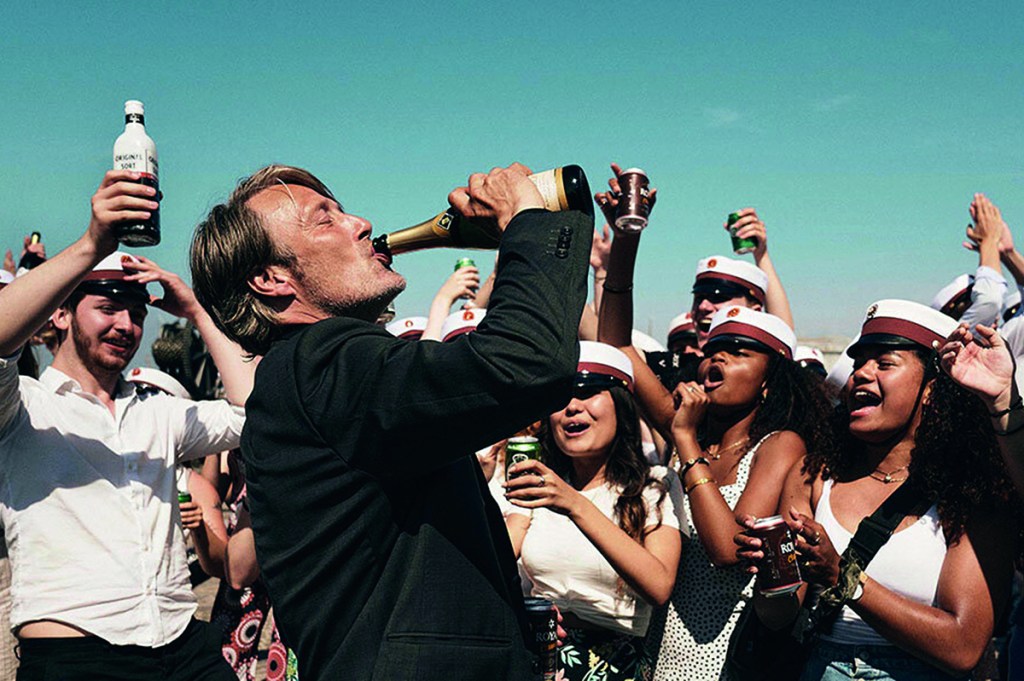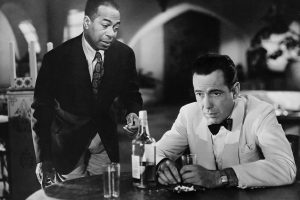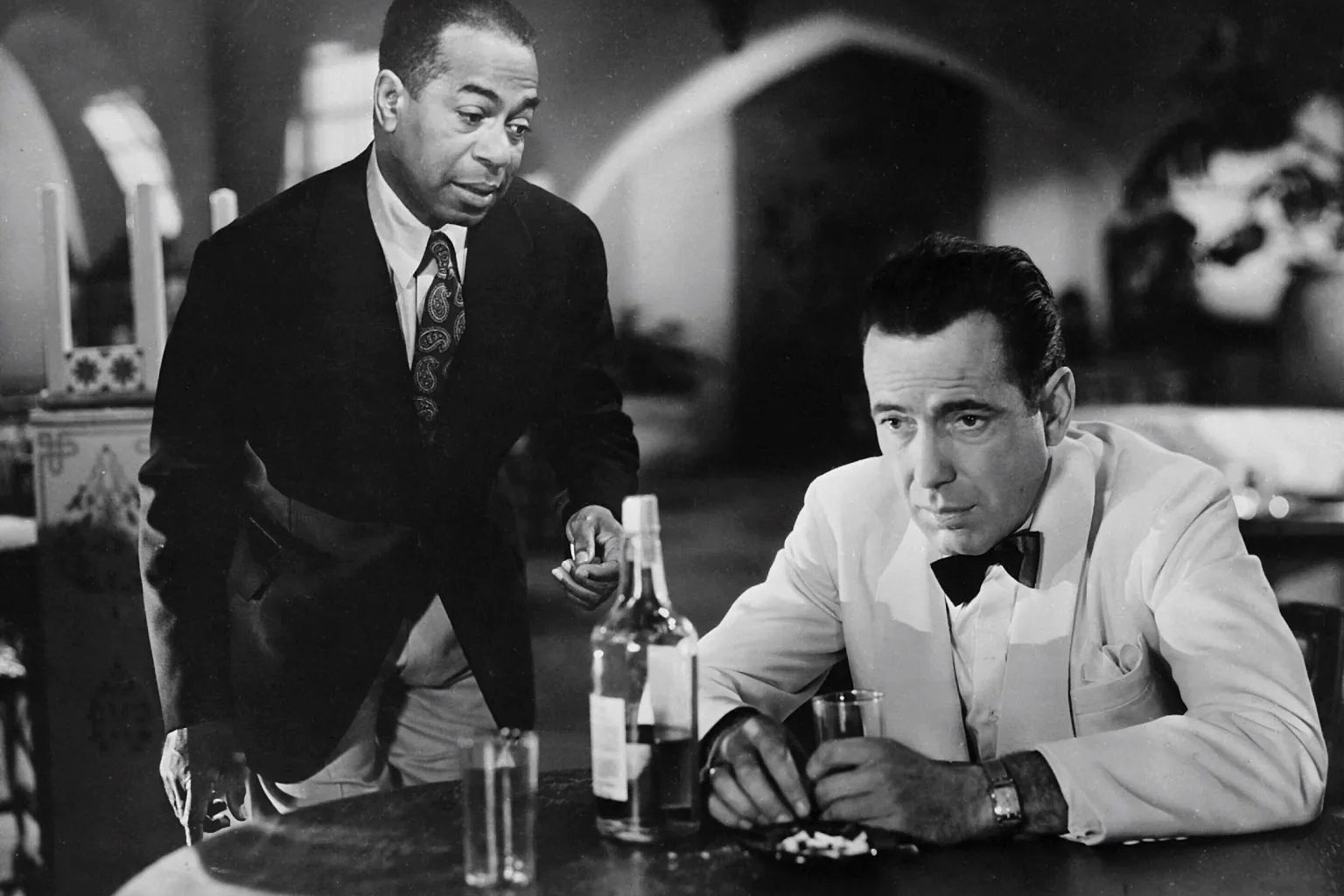Years ago, a friend of mine turned to me at someone’s birthday party and called beer ‘the universal panacea’. Beyond a physical intolerance to most alcohol, I can hardly tolerate alcoholics and their often appalling behavior. Anything that valorizes drinking alcohol, a drug whose societal acceptance is wildly at odds with its negative effects and addictive nature, is a hard sell for me. Unless you’re a member of the Jackass ensemble — that’s appointment viewing. If you’re getting bitten by scorpions and jumping off buildings for fun, a beer bong up the rear end is a nice surprise, at least in the world of cinema.
Thomas Vinterberg’s Another Round, starring Mads Mikkelsen, won the Oscar for Best International Feature Film this year, so going in I suspected it had little in common with the work of Knoxville, Steve-O and company. For a movie about high school teachers experimenting with drinking on the job to see if they’ll do better at it, Another Round is a surprisingly sober look at middle age. Martin (Mikkelsen) and his colleagues hit upon a theory by contemporary psychiatrist Finn Skårderud: human beings are born with a deficiency of alcohol in their blood — specifically, 0.05 percent BAC. Nikolaj (Magnus Millang) insists that maintaining that blood alcohol level will make them all ‘more creative and relaxed’.
Spurred by a collective doom as their hairlines recede and their lives looks less exciting, they all join in with gusto. What was promoted as a Champagne-soaked bacchanalia last winter turns out to be an even-handed study of hapless men in unstable periods of their lives. Another Round ends with the scene that’s featured on all the posters and in all the trailers, but that last exhausted expression of abandon is exactly that: abandon. By then, one of Martin’s friends, colleagues and partners in the Skårderud experiment has killed himself. All very romantic and depressing: after telling Martin that, ‘there’s nothing here,’ i.e., in drunken solitude, Tommy (Thomas Bo Larsen) gets on his boat, smokes a cigarette and goes out to sea to die. Martin takes Tommy’s advice and works out his problems with his wife.
That dance, so jubilant in freeze frame, comes immediately after Martin’s wife finally texts him back and admits she misses him, too. They’re going to get back together, and things are going to be all right. That dance is far from jubilant, but it is, in some respects, hard earned. Another Round may be the most bracing and true major film about alcoholism since Robert Zemeckis’s Flight, a 2012 drama starring Denzel Washington that completely blindsided me. Like Tommy, Washington’s character simply could not help himself, and his body would not allow him to say no.
Part of what’s so painful about the social acceptance of alcohol in the West is the ecstatic way it’s depicted in advertising and, most often, in movies and television. Not everything has to be dour, or a public service announcement — certainly not. But a movie like Another Round is sound tonic when it’s surrounded by other media where people drink like fish without effect or consequences. Vinterberg’s film began as a play, which his daughter Ida encouraged him to turn into a screenplay. She was slated to play Martin’s daughter before she was killed in a car crash four days into principal photography. Astonishingly, production continued, but with a revised script and an utterly different take on the material.
Denmark’s teenagers drink a lot: beer and wine at the grocery store by 16; at 18, anything goes. A culture of binge-drinking (the literal English translation of the original Danish title, Druk) is introduced early enough to be synonymous with youth, and indeed the film opens with a montage of Danish students drinking and having fun in the sun. But before that comes a Kierkegaard quote: ‘What is youth? / A dream / What is love? / The dream’s contents.’ Drunken boys’ nights beginning with a thin intellectual pretext quickly become journeys into ‘total oblivion’, as these semi-miserable men get blotto on custom-made, hyper-charged potions.
As always, it ends with someone pissing the bed, or walking straight into a doorframe in front of all of his (sober) coworkers. The latter moment made me laugh out loud, which doesn’t happen often at home alone. Rarer still is my fondness for these characters and this movie that does not condemn alcohol, but rather remains ambivalent. Even when Peter (Lars Ranthe) gives a student half a bottle of vodka before an oral exam — with positive results — you buy it. Before Ida’s death, Vinterberg planned to make a film that was ‘a celebration of alcohol based on the thesis that world history would have been different without alcohol.’ He’s certainly right, but by the end of the film, no one believes it’s done us much good, either.
This article was originally published in The Spectator’s October 2021 World edition.

























